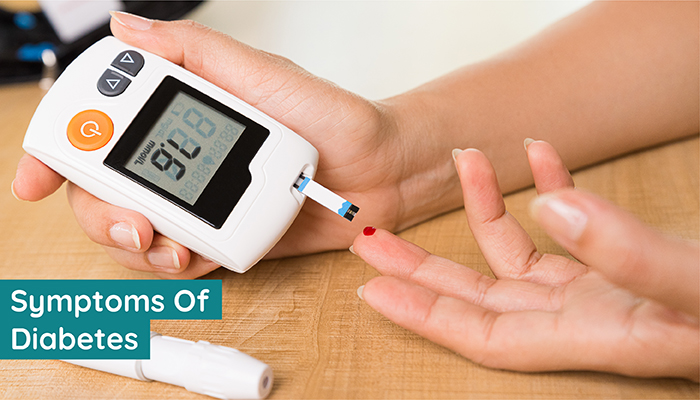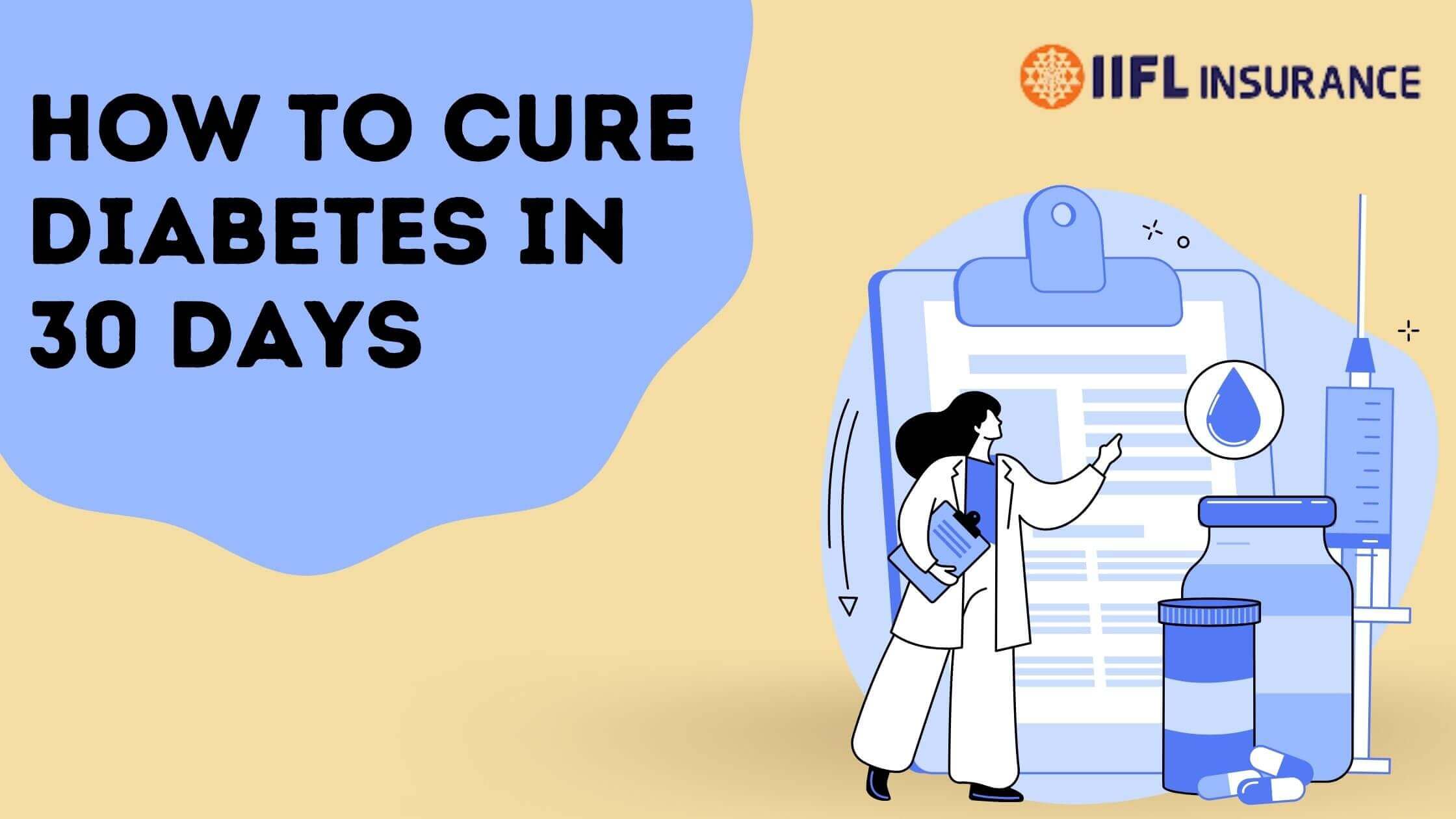What symptoms indicate diabetes? The majority of the early symptoms are caused by elevated levels of glucose (blood sugar) in your blood.
Moreover, the warning signs may be so mild that you can miss out on them. This is particularly the case for people with diabetes type 2. Some people are unaware of the fact that they have the disease until they suffer long-drawn consequences. Also, symptoms for type 1 diabetes generally appear quickly, within a matter of days or weeks. They are also much more serious.
What Are the Symptoms of Diabetes?
Diabetes is a life-long medical condition in which your body is unable to maintain a normal blood sugar level. An elevated level of blood sugar can result in diabetes symptoms, including the following:- Polyuria: It is the desire to urinate more frequently than usual. The number of stroom trips you make depends on your lifestyle, medications, and the amount of fluids you drink, and going to the toilet around 7 or 8 times each day can be an indication of diabetes type 2.
- Polydipsia: It is an increased thirst that is more intense than the feeling of thirst you get on a hot summer day. If water does not quench your thirst and your mouth makes you feel cottony and dry on a regular basis, you may be suffering from polydipsia.
- Hyperphagia: It is a bottomless hunger that surpasses the feeling of being hungry you get after skipping meals. If you eat a full and balanced meal and repeatedly return for more without feeling satisfied, you may have hyperphagia.
- Blurred vision.
- Unintentional weight loss.
- Dry mouth.
- Infections that are frequently unexplained.
- Weakness and exhaustion.
- Numbness or tingling sensations in the feet or hands.
- Sores or cuts that heal slowly.
Although both diabetes types, 1 and 2, have many similarities, their causes are quite different, and, in most cases, the treatment is also quite different. Detecting and treating diabetes early can help reduce severe diabetes complications that might occur if left untreated.
Symptoms of Type 1 Diabetes
The symptoms of type 1 diabetes occur faster, sometimes within a few weeks, as the pancreas stops making insulin in the body. Type 1 diabetes is more common in adolescence or childhood, but it can occur in adults as well.Since type 1 diabetes symptoms appear so rapidly, they are usually severe and noticeable. For instance, you might lose a considerable number of pounds in a couple of weeks even if you are eating more. You may also experience nausea, vomiting, and pain in your stomach. Furthermore, as diabetes type 1 develops quickly, your blood sugar levels may become extremely elevated before you can be diagnosed and receive treatment. This can occasionally result in a major emergency called ketoacidosis, which necessitates immediate treatment.
Symptoms of Type 2 Diabetes
Type 2 diabetes symptoms take longer to appear than type 1 diabetes symptoms because the pancreas gradually loses its ability to make enough insulin and insulin resistance. Type 2 diabetes can go undetected for years. When symptoms do emerge, they are frequently mild. It is easy to dismiss or misdiagnose them. People who have type 2 diabetes have progressively higher glucose levels in their blood over time, which can lead to:- Foot sores
- Pain and numbness in the limbs
- Skin changes
- Vision loss
Sex is not really a determinant for most diabetes symptoms. Nevertheless, a few manifestations are unique to people of different sexes.
- Diabetes symptoms in females include recurring fungal infections, dry and itchy skin, and urinary tract infections.
- Diabetes symptoms in males include weakened muscle strength, erectile dysfunction, and decreased sexual drive
Alternatively, parents will notice symptoms such as:
- Bedwetting
- Weight loss
- An increased requirement for diaper changes
- Being tired or weak
- Having little appetite
- Changes in mood
- Fruity-smelling breath
- Nausea
- Always feeling thirsty
- Vomiting
- Diaper rashes that do not heal
- Fast breathing
Symptoms Categorised by the Body Part
Diabetes can have a wide-ranging impact on the body, which includes the following:- Skin: Diabetes can impair your body's ability to heal wounds and scratches. This increases your risk of infection.
- Eye: Diabetes over a period of time causes blurry vision, and in patients where it is not well managed, it can result in vision loss.
- Arms and legs: Diabetes may result in diabetic neuropathy (numbness and pain in your arms and legs).
- Feet: Diabetes can decrease the flow of blood to your feet, making it difficult to feel scratches, cuts, and scrapes. It also brings down your body's capacity for healing such wounds.
- Bladder: Diabetes can trigger frequent urination and raise the likelihood of contracting urinary tract infections (UTIs).
Symptoms of Gestational Diabetes
Gestational diabetes, commonly understood as diabetes during pregnancy, is generally asymptomatic. If you are pregnant, your practitioner should screen you for the symptoms of gestational diabetes between weeks 24 and 28. If detected, you can introduce modifications to safeguard your health and the health of your baby.Prediabetes Symptoms
Prediabetes is a medical condition in which your blood sugar level is higher than normal but not elevated enough for a physician to classify you with diabetes. Even though prediabetes usually has no symptoms, you can follow certain steps to help prevent it.Symptoms of Diabetes Complications
Complications of diabetes type 2 may manifest as:- Skin itch (usually around the groin or vaginal area)
- Sores or cuts heal slowly
- Recurring yeast infections
- Weight gain
- Erectile dysfunction (ED) or impotence
- Velvety appearing darkening of the skin of the neck, axilla, and groin area
- Hand and foot tingling and numbness
- Vision impairment
Diabetic Coma
Hyperosmolar hyperglycaemic nonketotic syndrome (HHNS) is a serious condition that can cause complications such as diabetic coma and sometimes even death in any type of diabetes; however, it is more common is type 2 than in type 1. It occurs when your blood glucose levels become too high and your body becomes severely dehydrated. Its symptoms are presented here:- Blood sugar level greater than 600 mg/dl
- Severely dehydrated and dry mouth
- Severe thirst
- Skin, which is warm and dry and does not sweat
- A high-grade fever (over 101 °F)
- Loss of vision
- Hallucinations
- One-sided weakness of your body
When to Consult Doctor?
Consult with your doctor if you are experiencing any of the symptoms of diabetes. While booking your appointment, ask your physician if there is anything else you should do to prepare for it. For instance, the doctor may request a fasting blood glucose test, which will necessitate you not eating anything for 8 hours prior to your appointment. You should also record any symptoms you are experiencing as well as any recent life changes. If necessary, your physician may use this information in order to make a diagnosis.Medical Attention for Diabetes
- if you have persistent diarrhoea or are throwing up and are unable to keep any fluids or foods down.
- You have been feverish for the past 24 hours.
- Your blood sugar levels remain above 240 mg/dL, and ketones are present in your urine.
Takeaway
Diabetes symptoms are not always evident, especially in the initial stages. Knowing the symptoms can urge you to consult a doctor, particularly when they do not resolve or worsen.It is best to have your symptoms assessed as early as possible so that you can begin treatment, if necessary, and help reduce the possible damage to your body. If you are diagnosed with diabetes, your doctor will likely refer you to a registered dietician. They can help you develop a diabetes management plan that is tailored to your specific needs.
Your management strategy will consist of a combination of an exercise routine, dietary guidelines, and medications to control your levels of blood sugar. Your physician may also advise you to have regular blood sugar checks. It might require a little trial and error to find the best treatment plan for you.


